BIIP (Bahrain International Investment Park) Attracted over US$ 1.7 billion in Investment
Gerry Sharkey, Project Director at BIIP (Bahrain International Investment Park)
These investments are part of the substantial amount in excess of 500 million Bahraini Dinars which is about US$ 1.7 billion.
Interview with Gerry Sharkey, Project Director at BIIP (Bahrain International Investment Park)
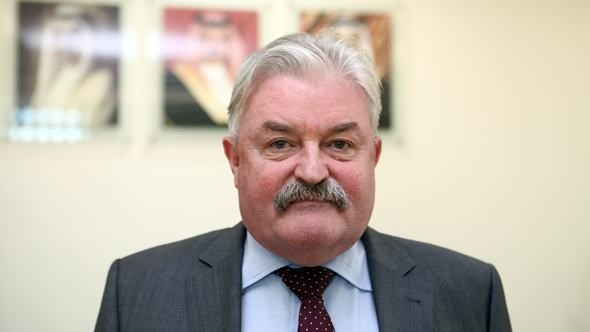
What is the strategy for the overall industrial development in Bahrain over the next few years.
In the week of the problems that happened here in February 2011, one of the biggest companies that has invested on this park made the final decision to go ahead and invest in this park. A couple of weeks earlier than that BASF, the biggest chemical company in the world, had decided to go ahead as well.
In the week of the problems that happened here in February 2011, one of the biggest companies that has invested on this park made the final decision to go ahead and invest in this park. A couple of weeks earlier than that BASF, the biggest chemical company in the world, had decided to go ahead as well. These investments are part of the substantial amount in excess of 500 million Bahraini Dinars which is about US$ 1.7 billion.
These investments are part of the substantial amount in excess of 500 million Bahraini Dinars which is about US$ 1.7 billion. This is a very significant investment in any environment but to have it happen during that period was a major success for Bahrain. In 2012 we supported 22 projects to come onto this park, which brings the total to 88 allocated projects. These 22 new projects supported in 2012 were not put off by what happened here or by any other factor. We believe that in 2013 and hopefully onwards we will continue to get more investment.
So what is the outlook?
The outlook is encouraging. Recently we were at a major food fair in Dubai where there was a very significant interest in Bahrain again being portrayed by a wide range of companies from around the world.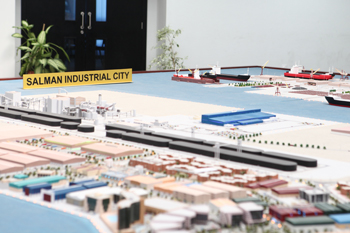
The reason why so many companies are keen to locate in BIIP is that a significant amount of the business that they do in the GCC is with very rapidly growing countries within the GCC i.e. Saudi Arabia and Qatar due to the huge amount of wealth that they are generating from their oil and gas industries. But these companies want to be located in an environment that is business friendly and this is a country that has a history going back to the 1930s in oil production, where it was a beacon and a leader in the Middle East in terms of how you go about business and how you make business happen. As a result, people feel very confident when they locate a business in this environment. I know that for European companies, which is where I come from, feel very at home here because business is done in a way that they are used to.
A question that may or may not apply arose when we interviewed some of the players in the real estate industry that rent offices, the comments were that the events that happened in 2011 made Bahrain even more competitive in terms of price. Did that affect you at all?
In fact that has played into our hands as well, it all alludes to the fact that we also have an international services program, promoting regional headquarters and other international services activities at the park. We really kicked that off in 2012, of the 22 business propositions that came in 30% of them were in international services, and they were related to the fact that we have competitive rents here on the park and they included companies like NCR and American Express who have put investments in that particular area.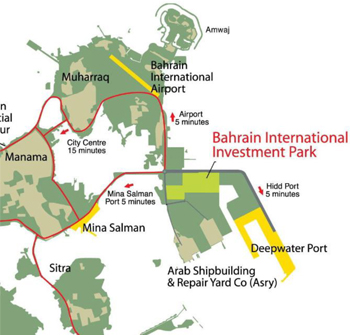
Can you explain what is the difference between a free zone and an economic zone? What sort of advantages or disadvantages do they hold?
Well, there are no disadvantages to the model that we have. Saudi Arabia does not like the whole concept of free zones so when the BIIP was being developed and the whole concept was being made a reality, it was decided not to go down the free zone route. The main reason is that when you produce a product in a free zone and you go to export your product, there is a duty of 5% upon that finished product. Because of the way the BIIP was orchestrated and developed that doesn’t happen here, so basically the 5% saving goes straight to the bottom line. We’ve got companies here that are in marginal businesses where this was a big factor in their decision process and part of the reason they selected Bahrain.
And these companies can export freely to the GCC countries and the United States?
Correct. We have a big project here in the park and 100% of its end product produced here in Bahrain will go to the USA and a key reason for them being here is the free trade agreement that Bahrain has had with the United States since 2006.
The occupancy rate is standing at around 80%…
We have allocated 75% of our land at the moment. There are currently 45 projects up and running. By the end of 2013 we are confidently expecting to have 60 projects in operation. The impact that this is having for us is very important, for example the people who run the port are coming to talk to us now about how we can work together to make things happen.
This didn’t happen in the past, we were a little bit isolated before as our park was developing independently of all these things, but now there is a synergy and a collectivism happening between us and other parties here in Bahrain. We can see that other people are constantly coming to us and asking to be involved with us, so it is obvious that the park is really beginning to make an impact at this stage.
In terms of economic impact, how would you quantify the effect of the park itself and also of its players?
Believe it or not, you are actually asking me a question which I will have the answer to directly in about 2 months’ time. However, just to give you some figures for the moment; there are 2000 additional jobs here that there wouldn’t be in Bahrain if this park didn’t exist at the moment.
In addition to that, the park is export driven; as we have already said we don’t cater for companies that are solely dealing within Bahrain, the businesses here have to be predominantly export related.
Therefore as a result of that, there has been a huge increase in export activities and by virtue of that fact there is an awful lot of synergy and collectivism happening between the companies here, we are getting a good quality cluster effect here in BIIP. This is creating both import substitution and increased exports as a consequence, so it really is beginning to make an impact and in two months’ time we are going to be able to clarify those figures. 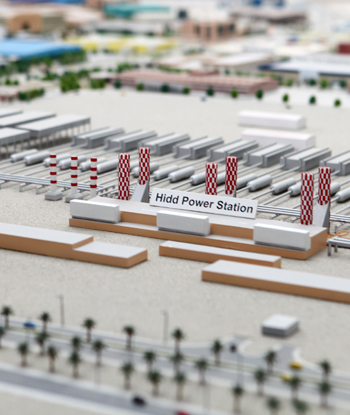
Now I would like to ask a question about challenges and problems, for example the availability of land. What are some of the problems that you are facing when talking to the investors?
Yes, we have a current issue but I think it will be sorted out in a short time. There have been difficulties with the causeway here because of the increased volume of activity that is happening, partially due to transhipment of products coming through the nearby port. We have to manage that, Bahrain had been in this situation before and we managed it well.
We need to get this addressed very soon and I think that will happen. The other issue that we are up against is that competition in the market place is going to be intense and so all classes in our environment are going to have to be monitored very closely places like UAE, and Oman.
There are a lot of business parks being created in Saudi Arabia itself now, and Saudi Arabia wants to get involved in much more foreign direct investment now than it did in the past. So these countries are all competition that we are up against but it has always been competitive and we are up for the task. We believe that our advantages far outweigh our disadvantages.
You mentioned that you would like to add some questions about gas or energy prices.
No, concerning energy prices I think I have answered in the last question. What is happening is that the competition is so intense in this area that prices on all issues are going to have to be maintained as close as they are at the present time. On the shorter term at least, we don’t envisage, unless there is a massive oil crisis around the world, a major spike in the price of oil or in relation to electricity or other factors that support the companies on the park.
Is the interest coming predominantly from western companies?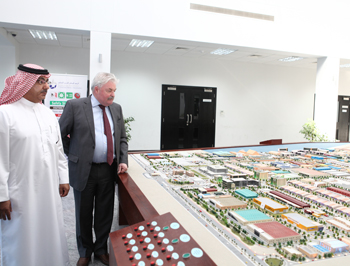
We are putting an increased effort on this, for example the King and our Minister have visited Asia in recent times, visiting countries like Japan, Thailand, Korea, India, and China. We are going to see more emphasis coming from Asian companies because of the market opportunities that the Middle East offers.
Also we are putting an increased effort into America; again because of the free trade situation there is always going to be a market opportunity for us with the USA. In the last two or three years Europe has been a very significant investor in the park, from Germany alone we have had 7 business propositions come to us in the last 3 or 4 years and we hope to continue to build on that in the future. Similarly I think the UK holds opportunities for us as well as other markets in Europe.
They are basically established to export to the largest market in the region which is Saudi Arabia…
Yes, exactly. That is the big driver for a lot of the businesses that have come here, the fact that you can have 100% ownership is a positive incentive, and if you are a public company the last thing you want to be doing is sharing your profits with somebody else.
Can you perhaps quickly mention if these companies are successful, what is the effect on the bottom line?
Since this park began in 2005, there have only been 2 projects that haven’t fulfilled their desired effect, other than that there has been no casualties on the park and we don’t envisage in the near future..
Are the companies happy about their revenues?
Yes, in fact this year we are going to have up to eight expansions within the park, which I think is a vote of confidence firstly in what the park is and how it is administered and secondly in the quality of doing business from here. The first project is Mondelez which was formerly Kraft, it is going to expand its factory by the end of 2013.
What sort of industries would you like to attract to fill the remaining allocations?
Well I think that we will be following the same trend that we have in recent years. We have put a big emphasis on secondary food processing. There are also plenty of opportunities for engineering companies who are supporting the oil and gas industry. We would like to see more medical related projects here, we have one or two that have really come through but we would like to see more in terms of medical devices and maybe in the generic pharmaceutical industry where for example India is powerful and strong along with South Africa.
These are two opportunities for the Middle East and there is a market opportunity in those areas. Further to that I would say downstream activities within the fibreglass field again because we have a frontline fibreglass company on the park. There are opportunities for other companies to come along and leverage off their product.
I would like to ask you about the one stop shop, you say this is genuinely a one stop shop, I have heard it many times in previous interviews…
These are two opportunities for the Middle East and there is a market opportunity in those areas. Further to that I would say downstream activities within the fibreglass field again because we have a frontline fibreglass company on the park. There are opportunities for other companies to come along and leverage off their product.
It is very much hands on; it is not something that we put up on a slide and say that what we run is a one stop shop. It is a constant; in fact there are two guys whose full time job is to run this department. So when a company comes through and we support them and bring them to our committees, we hand the case to those guys and they basically do all the interface to ensure the company can achieve its stated deadlines.
Companies especially foreign companies are very supportive of this service. It is a big undertaking on our part because we could actively use those two guys in other activities but we see this as a primary part of what we should be doing and how we should be able to support companies to get their operations up and running quickly.
Thank you for the interview, is there anything you would like to add?
I think we’ve covered most of what you wanted, or what I think we can offer you from our side. As I said to you, hopefully within two years we will have filled this particular park with projects. And to follow on, Bahrain would like to have a significant portion of its business in the non-oil and gas areas.
I think this park has proven to be a success so we would like to see the opportunity to replicate this again here in Bahrain. The difficulty as you have heard is the land issue. We have made an application to our Minister, hopefully we will be able to get a second phase development somewhere on the island, either directly, or on reclaimed land.
Are there any areas available?
There are none, it is a scarce commodity. As soon as land becomes available everybody wants it, but on top of that, Bahrain has a very aggressive policy of reclaiming land from the sea so it may be from there that our next phase might evolve.